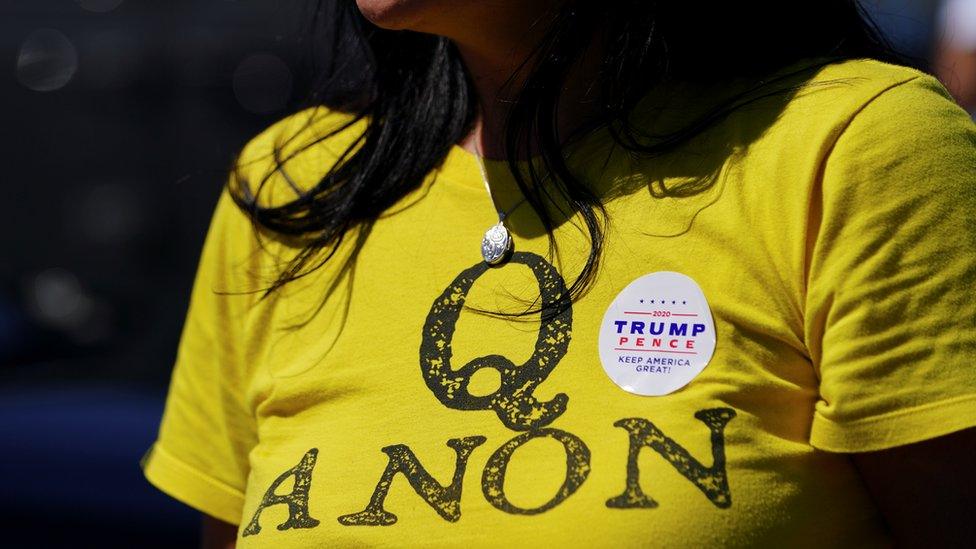What's behind the rise of QAnon in the UK?
- Published
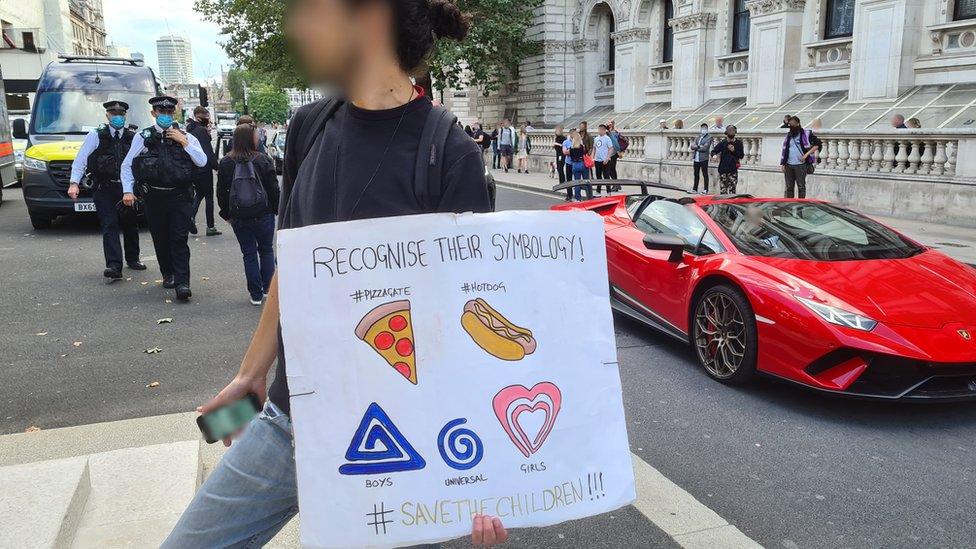
Some protesters in UK "Save Our Children" rallies believe in Pizzagate and QAnon conspiracies
A wide-ranging conspiracy theory about elite Satan-worshiping paedophiles has migrated from the US, inspiring a series of regular street protests. How did QAnon find a British audience?
On a sunny day in late August, nearly 500 people gathered in central London. It was the first event held by a new group, Freedom for the Children UK.
As the crowd marched from the London Eye to Buckingham Palace, chants of "Save our children!" echoed in the air.
The ethnically diverse crowd was made up mostly of young people and women, some with their children. At the head of the march were group leaders Laura Ward and Lucy Davis.
Ms Ward, 36, who says she underwent a "spiritual awakening" during the Covid-19 lockdown, created a Facebook group in July "to promote and organise peaceful events that raise the awareness of child exploitation and human trafficking". It took off, gathering thousands of followers in just a few weeks.
The London march was just one of 10 rallies held across the UK, including events in Birmingham, Bristol and Manchester. A Liverpool rally drew similar numbers of people.
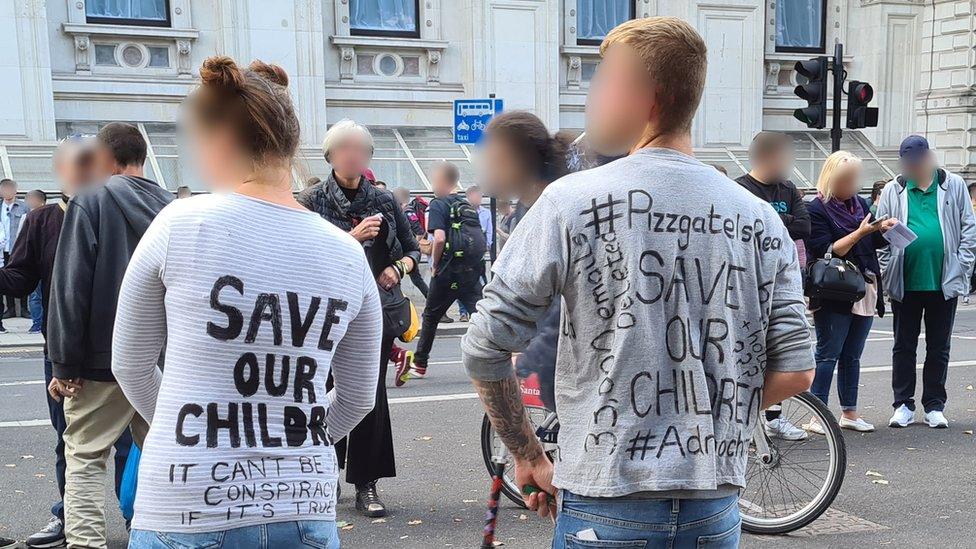
Protesters at a "Save Our Children" rally in London
The organisers say their movement is not directly linked with QAnon, a wide-ranging, baseless, pro-Trump conspiracy theory.
But their themes are similar, and their evidence-free claims largely the same. And when images began to appear on the FFTCUK Facebook group later that day, placards, signs and items of clothing directly referencing QAnon were prevalent at almost all of the rallies, external.
What is QAnon?
QAnon began life - most likely as a joke or prank - on extreme message boards in 2017. It's an unfounded conspiracy theory that claims President Trump is secretly battling a clandestine network of Satan-worshipping elites who run a child trafficking ring.
The "Q" in QAnon is the person or persons writing cryptic messages to the movement's followers. Q claims to have top secret clearance within the US government. Q has told followers to "trust the plan" for a "great awakening". The messages have predicted mass arrests or purges of top Democratic Party officials. And none of the prognostications have come true.
Despite its bizarre premises, QAnon took off in niche online communities and rapidly grew on social networks.

BBC Trending
In-depth reporting on social media and online culture. Listen to our podcast - from the BBC World Service.

What is #SaveOurChildren?
Until this year, the conspiracy theory was confined to the internet's fringes. But then came the pandemic. QAnon influencers took advantage of fear, uncertainty and doubt - and the fact that many people were at home, worried, and living more of their lives online.
Surveys from the Pew Research Center indicate that the number of Americans who are aware of QAnon and support its ideas increased substantially this year, external. Supporters have been linked to several violent crimes.
In light of this, several major social networks including Twitter, Facebook and TikTok began restricting QAnon terms, phrases and hashtags on their platforms over the summer.
Believers changed tack. Urged by a Q message to "learn the use of camouflage digitally", followers avoided direct references to QAnon and began hijacking well-known, established hashtags and phrases used by genuine campaigners against child trafficking, external - such as the innocuous sounding #SaveTheChildren and #SaveOurChildren.
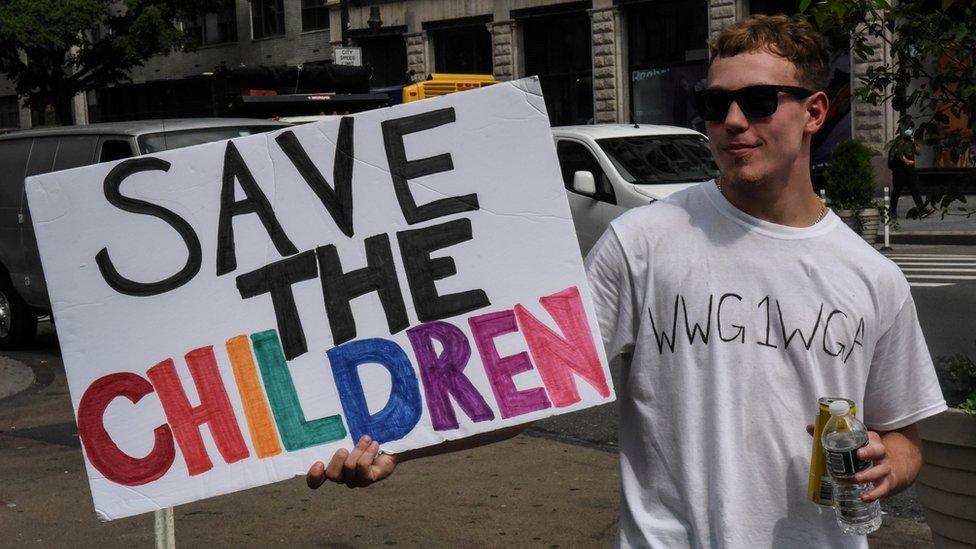
A man at a "Save the Children" rally in New York
A BBC analysis based on data from Facebook-owned tool CrowdTangle, and Spredfast, found that in the last three months, the two hashtags were used a total of 1.5 million times on Twitter and generated more than 28 million interactions on public Facebook and Instagram posts.
And outside the US, British followers lead the way. Our analysis of online data from the last three months puts the UK ahead of all European countries, followed by Germany and the Netherlands.
Marc-Andre Argentino, a researcher at Concordia University in Montreal, has identified at least 114 Facebook groups which spread QAnon content under the guise of campaigning against child trafficking.
Membership of such groups has risen by more than 3,000 percent since July, he says.
Allow X content?
This article contains content provided by X. We ask for your permission before anything is loaded, as they may be using cookies and other technologies. You may want to read X’s cookie policy, external and privacy policy, external before accepting. To view this content choose ‘accept and continue’.
A key British YouTube influencer is Charlie Ward, who lives in Spain and began uploading QAnon-themed videos during lockdown.
While older clips about his personal life received barely any attention, his channel now boasts more than 170,000 subscribers and he has hosted discussions with FFTCUK leaders.
Mr Ward did not respond to a request for comment.
How did it take off in the UK?
In May, Ms Ward (no relation to Mr Ward) began engaging with social media posts by conspiracy theorist David Icke and a number of QAnon influencers in the US and Canada about Covid-19 lockdowns, George Floyd protests, and global child trafficking.
"I'm feeling powerless and I want to do more to create change. What do you suggest?" she tweeted at a Canadian QAnon influencer.
A few weeks later, inspired by a global "Save Our Children" movement launched by a California-based rapper and actor, external, Ms Ward set up the FFTCUK Facebook group with the aim of launching a similar movement at home.
By the end of August, Save Our Children street rallies were held in more than 200 towns and cities around the world, including a dozen in the UK.
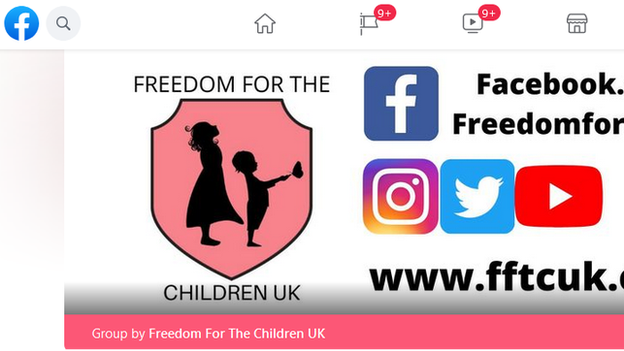
The FFTCUK Facebook group has attracted thousands of members
The FFTCUK Facebook group has now amassed more than 13,000 members. While moderators are cautious about direct references to QAnon, discussion in the group is peppered with QAnon-related talk and hashtags.
Members also routinely organise coordinated online campaigns targeting news organisations.
For instance, when an independent magazine published a piece about a local FFTCUK rally, its Facebook page was swamped by comments that abused its staff. This, coupled with threats of violence, led the magazine to temporarily deactivate its social media accounts.
On their personal accounts, FFTCUK leaders are vocal about their beliefs.
Ms Ward's Twitter and Facebook accounts feature frequent accusations of paedophilia against leading US Democrats, and she regularly defends QAnon and its followers. She turned down an interview request for this story.
Why is QAnon spreading during the pandemic?
The vast majority of the protesters on the FFTCUK march in August ignored Covid-19 restrictions and social distancing guidelines.
As they finished the march and gathered near Wellington Arch for a meditation session, Ms Ward talked about a "fake pandemic".
While most of the UK rallies are organised by Ms Ward and FFTCUK, one in London was co-organised by StandUPX, a campaign group behind rallies featuring speakers such as David Icke. The rallies attract a wide range of speakers and attendees, from those who oppose government restrictions to those who claim that the pandemic is a "hoax" or somehow caused by 5G technology.
A spokesperson for StandUPX said: "We cannot be accountable for the views of each and everyone appearing at the rally and have no views about QAnon."
Experts say a number of national controversies and scandals in relation to elite child abuse had already primed the UK for the rise of conspiratorial narratives.
"Activists in the UK have easily woven British issues - such as Operation Yewtree investigations into historical child sexual abuse - into Q narratives," says David Lawrence, a researcher for the campaign group Hope not Hate.
"Long before the birth of QAnon, prominent British conspiracy theorists have promoted ideas about elite, occult paedophile circles engaging in large-scale child trafficking and abuse, and British activists are drawing on this broader tradition," he says.
And the upheaval of the pandemic created a perfect storm which helped QAnon find common ground with Covid-19 conspiracists.
"Public trust in institutions has declined in the UK in recent years, and has been exacerbated by the handling of the pandemic," Mr Lawrence added. "This has provided ideal conditions for conspiracy theories to spread."
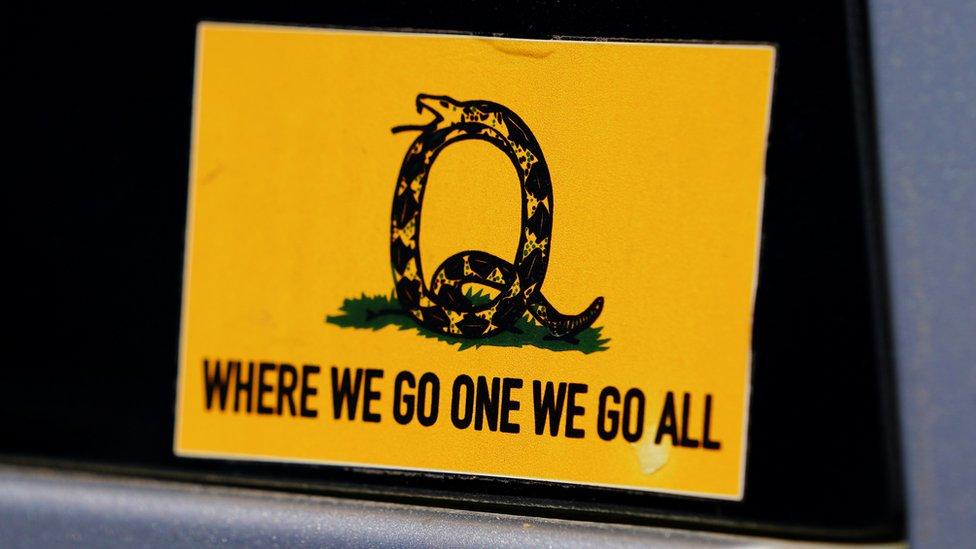
WWG1WGA, short for "where we go one we go all", is a rallying cry for QAnon followers
What do Save Our Children protesters believe in?
Two weeks after their first protests, FFTCUK held a bigger protest in London on 5 September. Around 1,000 people marched from Oxford Street to the BBC's Broadcasting House, and then to Parliament Square.
The protesters paused outside the Disney Store on Oxford Street. "Shame on you," they angrily chanted, echoing a widely-held, evidence-free belief among QAnon followers that the company is part of a child trafficking cabal.
Allow X content?
This article contains content provided by X. We ask for your permission before anything is loaded, as they may be using cookies and other technologies. You may want to read X’s cookie policy, external and privacy policy, external before accepting. To view this content choose ‘accept and continue’.
Once again, women and young people were at the forefront of the march.
People were dressed in QAnon shirts or ones displaying the slogan "WWG1WGA". Short for "Where we go one we go all", it is the best-known rallying cry for QAnon believers.
Other bizarre terms - albeit ones well-known to QAnon followers - were on display: "adrenochrome", "frazzledrip", "dark to light", "spirit cooking", "paedogate".
One marcher held up a placard referencing Pizzagate, a conspiracy theory that alleged Hillary Clinton and Democratic Party politicians were running a paedophile ring out of a Washington pizza restaurant. It prompted a heavily armed man to enter the restaurant, searching for non-existent child prisoners. He was later sentenced to four years in prison.
In London, the vast majority of the protesters I spoke to said they first heard about FFTCUK via social media, especially Facebook.
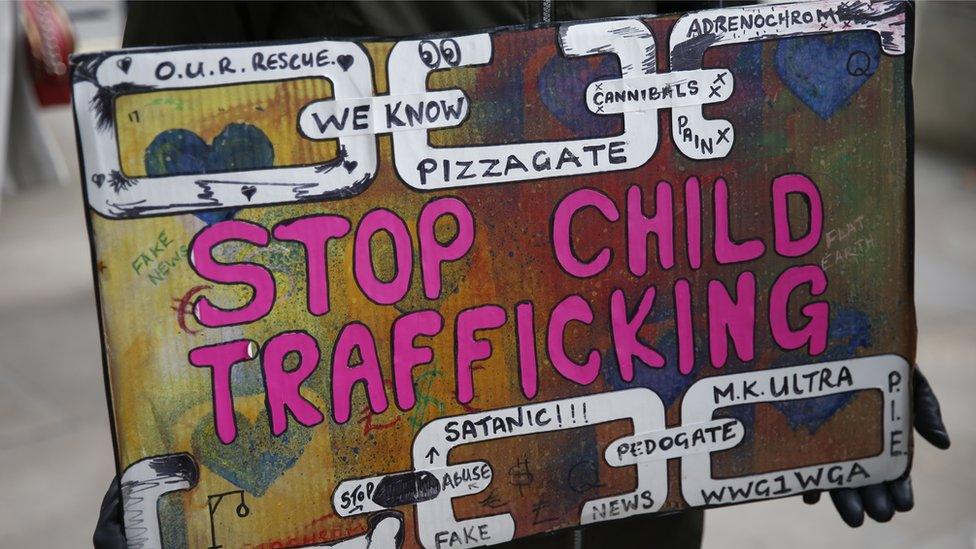
A placard in a London Save Our Children rally features well-known QAnon terms and slogans
Some said they fully believed in QAnon and followed every Q message, while others were only partially familiar with it. There were supporters of President Trump, people who don't like him very much, and those that said they don't pay much attention to politics.
However, they all shared a strong suspicion of the establishment, coupled with the belief that there is a "deep state" of elites in the UK who are committing crimes against children with impunity.
"Pizzagate is 100% true," said Jada, a young protester. "There are paedophiles in our elite everywhere and they need to be taken down. This is happening in the US, in the UK and all over the world."
"I'm not sure if I'm QAnon, I don't follow that stuff much," said Audrey, another young protester. "But the deep state is not a secret, it's not a conspiracy theory."
And although she said she was initially not a fan of President Trump, her opinion has recently changed.
"He's doing a lot of good but that's not being shown on TV," she said.
What do legitimate charities say?
Charities and professionals who work to fight real child abuse and human trafficking say the conspiracy theorists aren't helping by supposedly "raising awareness". In fact, they say they're distracting attention away from real crimes and authentic issues, external.
Allow X content?
This article contains content provided by X. We ask for your permission before anything is loaded, as they may be using cookies and other technologies. You may want to read X’s cookie policy, external and privacy policy, external before accepting. To view this content choose ‘accept and continue’.
Laura Duran, senior policy and research officer at Every Child Protected Against Trafficking, says QAnon's false claims about child trafficking are "a slap in the face of survivors who have gone through exploitation".
As an example, she cites the viral Wayfair conspiracy theory, which claimed in June that a US-based furniture retailer was involved in trafficking children.
The viral, untrue rumours caused "a significant level of trauma and distress to child trafficking survivors," Ms Duran says.
Why is it appealing to women?
Although QAnon has always had female followers, the sudden shift towards #SaveOurChildren seems to have brought into fold even larger numbers of women, some via health, yoga and wellness Facebook groups and Instagram accounts, external.
The majority of the FFTCUK Facebook group's admins are women, and a few come from wellness communities.
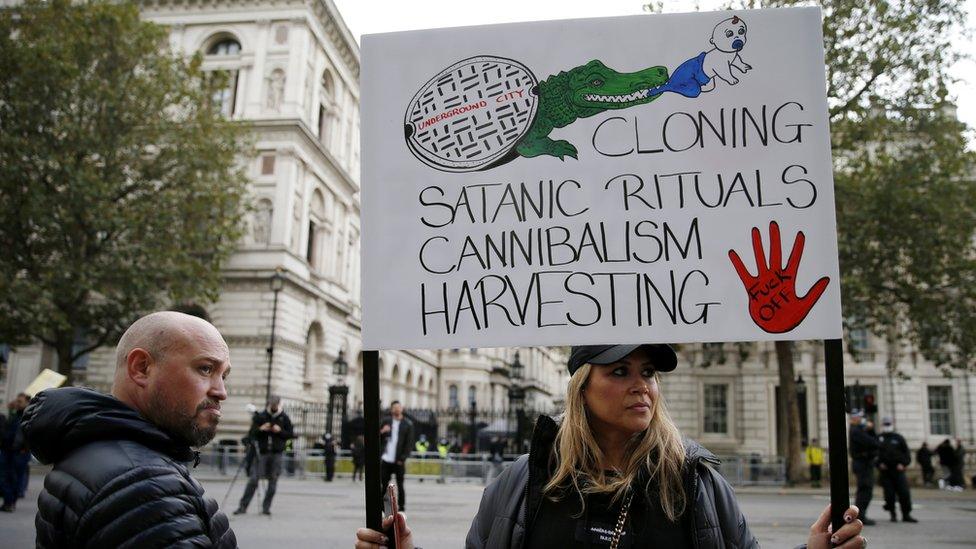
The rise of Save Our Children content in health and wellness-focused communities has brought more women into QAnon
"Early barrages of viral disinformation in the UK lockdown spread 5G and 'fake virus' narratives, both of which found their way into anti-vaccination communities and then wellness groups," says Joe Ondrak, a senior investigator at Logically, a tech startup that fights online disinformation.
"From here concerned 'Facebook mums' and other well-meaning parents stuck online started doing 'research'" - in the conspiracy world, this usually means watching YouTube videos and trawling fringe websites - "or finding videos reasserting conspiracy beliefs," he says.
Annie Kelly co-presents the weekly QAnon Anonymous podcast, which investigates the movement, external. She also reported on the first FFTCUK rally in London. She says by focusing on highly emotive content about child safety, #SaveOurChildren has managed to "worm its way into normal, basically apolitical parenting groups".
On Instagram, "soft" QAnon narratives have crept into content posted by female lifestyle influencers with tens of thousands of followers.
Allow X content?
This article contains content provided by X. We ask for your permission before anything is loaded, as they may be using cookies and other technologies. You may want to read X’s cookie policy, external and privacy policy, external before accepting. To view this content choose ‘accept and continue’.
Mothers who spend time in online communities where concerns about children's products and content are shared have been a key driver of the new wave of QAnon believers, Ms Kelly adds.
"They can very easily become influencers themselves by sharing things they've noticed which they think add to the conspiracy," she notes.
The demographic makeup of the UK marches is significant, the experts say, as it does not match the stereotypical crowd of young men drawn from the right and the far-right.
"These weren't your typically 'red-pilled' conspiracy theorists," says Nick Backovic, a contributing editor at Logically. "They were worried mums and dads who had been scared into believing these exaggerated stats that aren't backed up by any evidence."
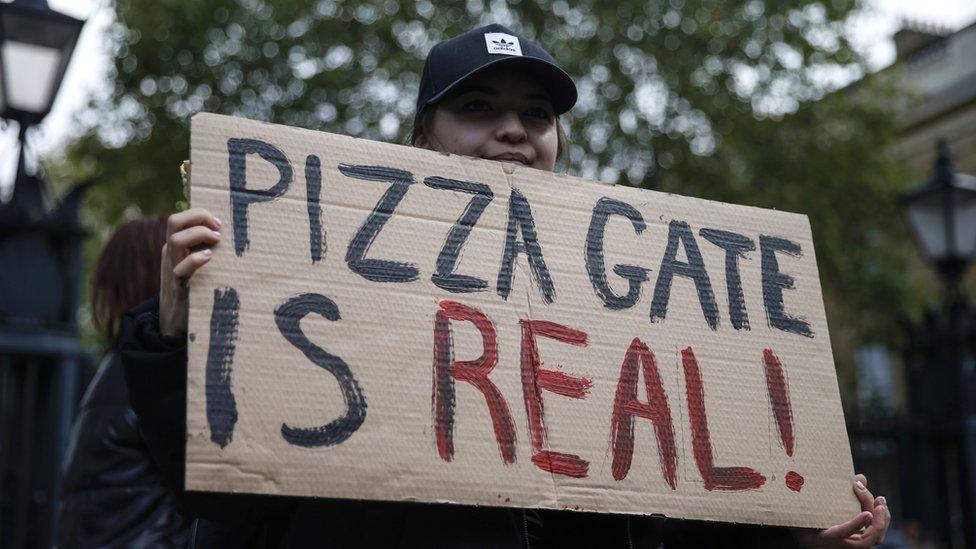
Despite its considerable growth in 2020, the appeal of QAnon in the UK remains small compared to the US
Growth continues
In terms of size and appeal, the British QAnon movement is still fringe compared to the US, where the conspiracy has leaked into the mainstream. A number of politicians who have previously endorsed QAnon, external are set to win seats in Congress and state or local legislatures in November's elections.
But the growth of QAnon in the UK also shows no sign of stopping.
Every Sunday, Ms Ward and Ms Davis broadcast on Facebook Live to update members about their plans and discuss ways to spread the message.
The FFTCUK group keeps adding members, and further events are planned.
Follow Shayan, external on Twitter.
Subscribe to the BBC Trending podcast or follow us on Twitter @BBCtrending, external or Facebook, external.
- Published22 July 2020
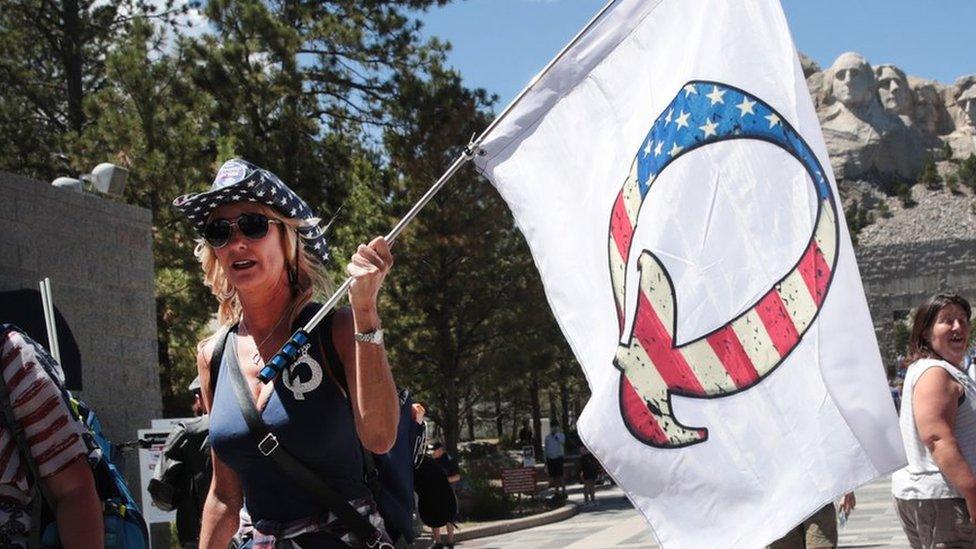
- Published6 January 2021
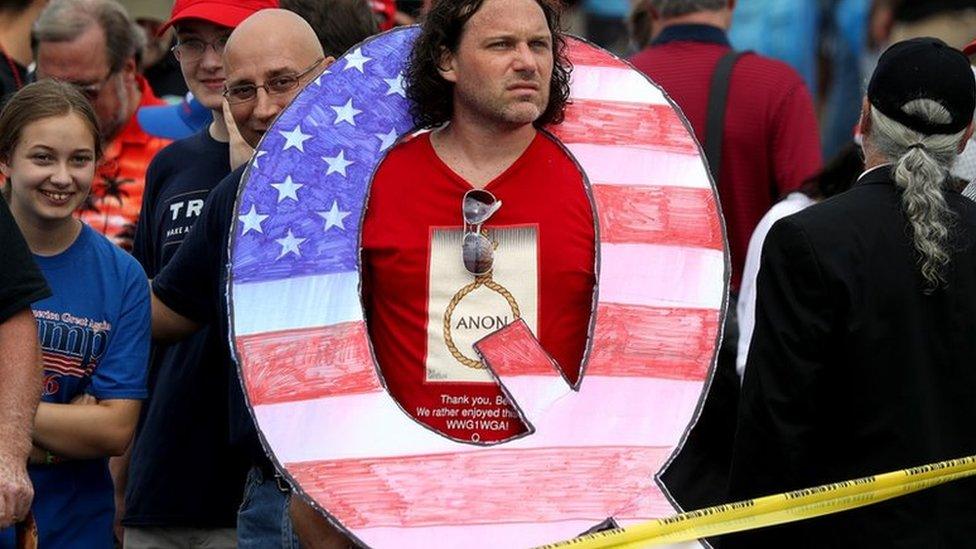
- Published3 September 2020
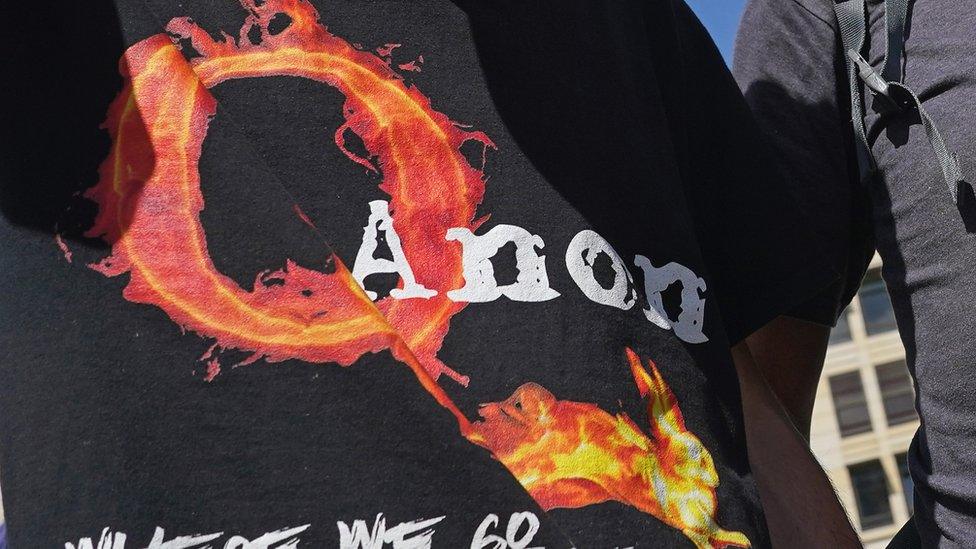
- Published20 August 2020
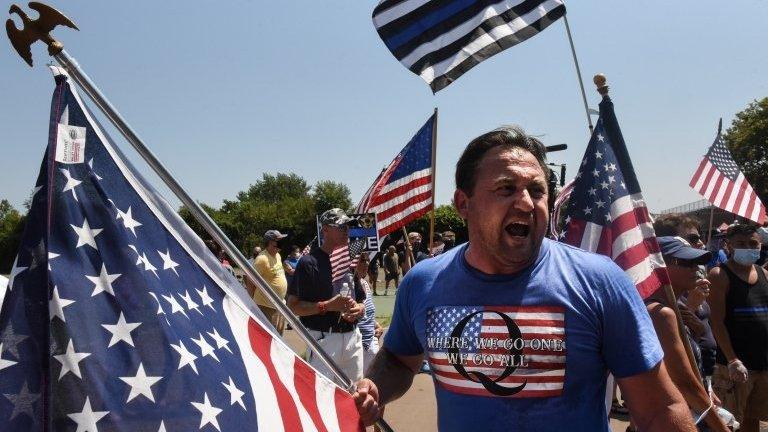
- Published7 August 2020
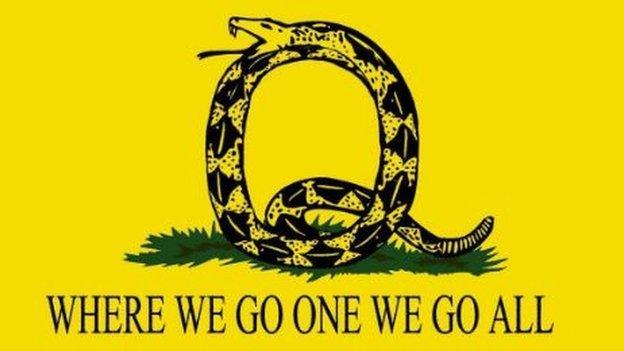
- Published6 October 2020
